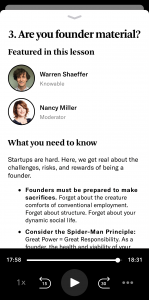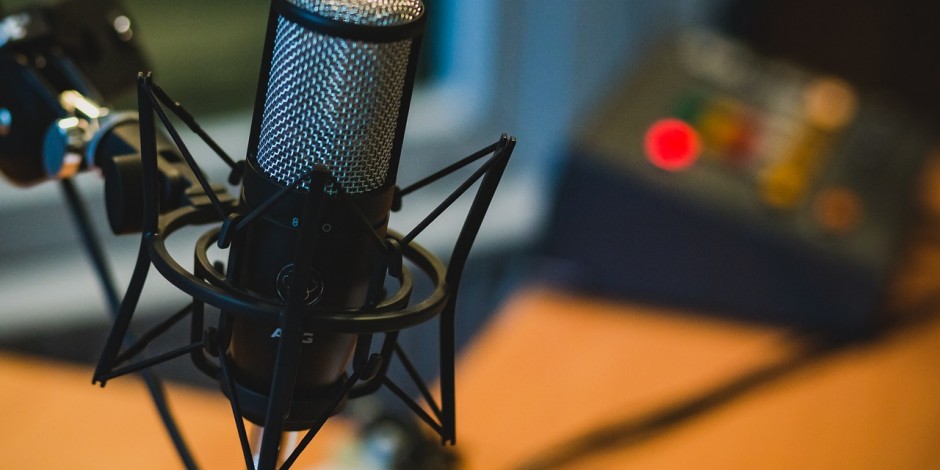Brand, brand, brand. Put yourself out there — no matter the topic. Podcasts are done with voice and people want connection.
part of my series of interviews about “5 things you need to know to create a very successful podcast”, I had the pleasure of interviewing Rachel Brenke.
Rachel Brenke is the head attorney behind TheLawTog® — the legal resource for photographers, RachelBrenke.com, FitLegally®, and the host of The Business Bites Podcast®.
As an MBA, business consultant, multi-state licensed attorney, she knows the ins and outs of what goes into running a business AND how to legally protect yourself. Not only does Brenke have real world entrepreneurship experience, but she combines this with her intellectual property law and business knowledge to provide a one-stop resource to help protect your business.
Her resource is currently helping creative industry professionals all over the world initiate, strategize and implement strategic business and marketing plans through various mediums of consulting resources and legal direction.
With hundreds of thousands of visitors a year, TheLawTog.com has become the go-to legal resource in the industry. Pair this with the international stages that have held TheLawTog’s teachings, you’re sure to learn a lot from Brenke. Brenke’s experience and teachings have been featured on CreativeLIVE, WPPI, Professional Photographers of America, Business Insider, TedX, International Business Times, and more.
As a mother of five, Army Veteran spouse, Team USA Athlete, and IronMan competitor — she understands that life is busy, and we don’t have time to mess around.
Disclaimer: I am a lawyer but I’m not your lawyer! View my entire disclaimer here
Websites: https://rachelbrenke.com
Facebook: https://www.facebook.com/RachelBrenke2/
Instagram: https://www.instagram.com/rachelbrenke/
Thank you so much for doing this with us! Before we dig in, our readers would love to get to know you a bit more. Can you tell us a bit of your “personal backstory? What is your background and what eventually brought you to this particular career path?
When I was back in elementary, middle-school, I knew that I would never fit into a box. I was always giving my teachers suggestions on how they could do things better. As you can guess, it wasn’t very well-received. Fast forward a few years, I’m in college studying criminal law and married. We had our first son, and I realized that I didn’t want to work for someone else’s dreams and goals. At that point, I really dug into learning business. I got my MBA and then later went to law school. I was doing photography while in law school and realized the need for photography-related legal education. Eventually, TheLawTog® was born to help photographers with their legal needs and education.
Can you share a story about the most interesting thing that has happened to you since you started podcasting?
Due to my exposure through podcasting and speaking my story was picked up by Ironman Tri and NBC Sports. I was invited to compete as a featured athlete in the 2018 Ironman World Championships and had cameras follow my whole journey.
Can you share a story about the biggest or funniest mistake you made when you were first starting? Can you tell us what lesson or takeaways you learned from that?
My biggest mistakes were spending time on things that didn’t’ require my fingers or time. I tried to be the best house cleaner and homemaker when it was taking away from my business time.
How long have you been podcasting and how many shows have you aired?
My first show kicked off in June 2016. Currently, we have 117 episodes with more scheduled!
What are the main takeaways, lessons or messages that you want your listeners to walk away with after listening to your show?
My goal with each episode is to give quick bites of education with actionable steps that business owners can take now. I’m pretty transparent with mistakes I’ve made and lessons I’ve learned so hopefully they don’t have to learn the hard way.
In your opinion what makes your podcast binge-listenable? What do you think makes your podcast unique from the others in your category? What do you think is special about you as a host, your guests, or your content?
Most of my episodes are 15–20 minutes. I recognize that entrepreneurs are busy, so I want to give them valuable education as well as valuing their time. I own my own businesses, so the education I give is real-time and things I’m currently using myself. When we are vetting guests for the show, we look for people that fit our client avatar and have topics that they will relate to the best.
Doing something on a consistent basis is not easy. Podcasting every work-day, or even every week can be monotonous. What would you recommend to others about how to maintain discipline and consistency? What would you recommend to others about how to avoid burnout?
Don’t try to do everything on your own. Also, batch-processing is a life-saver. My team works towards finding guests or brainstorming topic ideas if I’m recording solo. They make sure to get the guest terms signed and guest assets turned in, and then I do the interviews. I try to record multiple episodes at a time, and I have set days every week that I schedule interviews on. Once the episodes are recorded, then my team works on getting them ready to post on the website and links and assets out to our guests. We try to have extra episodes ready to go because we all know that life happens…especially when we aren’t expecting it.
What resources do you get your inspiration for materials from?
I have a Facebook group for TheLawTog® where I get some of my topics. I just listen to what people are asking about and needing. When I see the same questions being posed over and over, then I will record an episode about that topic. I don’t just look at my group though. I pay attention to what is going on all through social media. Sometimes things come up in my own businesses that inspire topics as well.
Ok fantastic. Let’s now shift to the main questions of our discussion. Is there someone in the podcasting world who you think is a great model for how to run a really fantastic podcast?
One of my favorite podcast hosts is Amy Porterfield
What are the ingredients that make that podcast so successful? If you could break that down into a blueprint, what would that blueprint look like?
Identifying your audience avatar and combining that with the unique selling proposition. The USP is not only the niche but the format of shows and platforms where the shows are delivered.
You are a very successful podcaster yourself. Can you share with our readers the five things you need to know to create an extremely successful podcast? (Please share a story or example for each, if you can.)
- Identifying the target listener avatar — down to their specific demographics, characteristics, preferences and name
- Identifying a unique selling proposition — Identifiying aand putting out what makes you different than other similar podcasts
- Focusing on specific format — this goes along with the avatar — what is your avatar interested in? Solo? Interviews? Long form? Quick?
- Focusing on specific platform s- whereis your avatar? Spotify? Apple? Or prefer a native podcast player.
- Brand brand brand. Put yourself out there — no matter the topic. Podcasts are done with voice and people want connection.
Can you share some insight from your experience about the best ways to: 1) book great guests; 2) increase listeners; 3) produce it in a professional way; 4) encourage engagement; and 5) the best way to monetize it? (Please share a story or example for each, if you can.).
- Sometimes, we have people reach out to us about being on the show. We go to their websites and look at their blogs and social media. If we feel they may be a good fit, then we move on to the next steps. When we come across someone we want on the show, we reach out via email telling them why we would like for them to be on the show and why we think they would be a great fit for our audience.
- The podcast is hosted on multiple platforms including iTunes, Stitcher, Spotify, etc. We also have it posted on our website with show notes and links to related episodes and other tools and resources that can further their education. The day the episode airs, we post episode graphics across our social media channels. If we had a guest, we provide them with a graphic to use as well.
- We have a defined workflow that we use to make sure we stay consistent from show to show. Each episode has its own board in Monday.com with each step of the workflow. This allows others to step in and fill in when necessary. We use email templates for different parts of the process, changing them up to personalize for each guest. By doing this, we ensure that steps aren’t forgotten.
- To encourage engagement, we link to the Business Bites Facebook group on every episode page. We post 3 times a week for each episode; each post also has a link back to the episode. Every episode also has a link to a downloadable guide available only to members of the FB group. Our 3 posts consist of a link to the episode with a blurb saying what it’s about, an engagement question relating to the topic, and we end the week with a quote from the show. Anytime someone comments, one of us is there to reply to try to keep the conversation going.
- We have just recently started taking sponsorships for our shows. I’m also an affiliate for Amazon and other businesses and will link different resources from there.
For someone looking to start their own podcast, which equipment would you recommend that they start with?
A computer and an internal microphone. Turn on quick time, throw a blanket over your head to reduce sound and done!
Ok. We are almost done. 🙂 Because of your position and work, you are a person of enormous influence. If you could inspire a movement that would bring the most amount of good to the greatest amount of people, what would that be? You never know what your idea can trigger. 🙂
I would want to impress on quality of life over business. No matter how much we love business — life is more important.
How can our readers follow you online? Instagram: @rachelbrenke @businessbitespod. Facebook: @rachelbrenke2 Website: https://rachelbrenke.com








